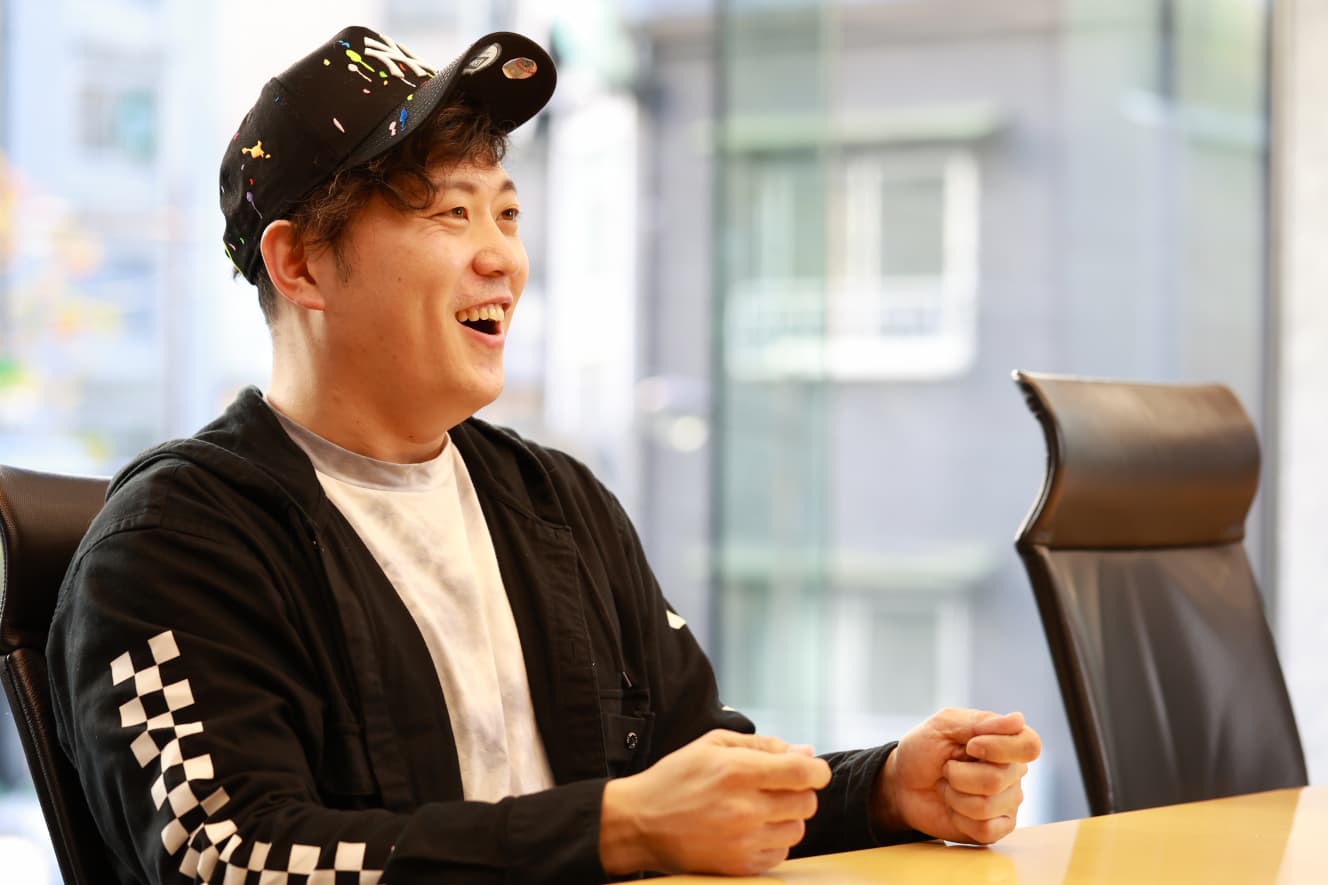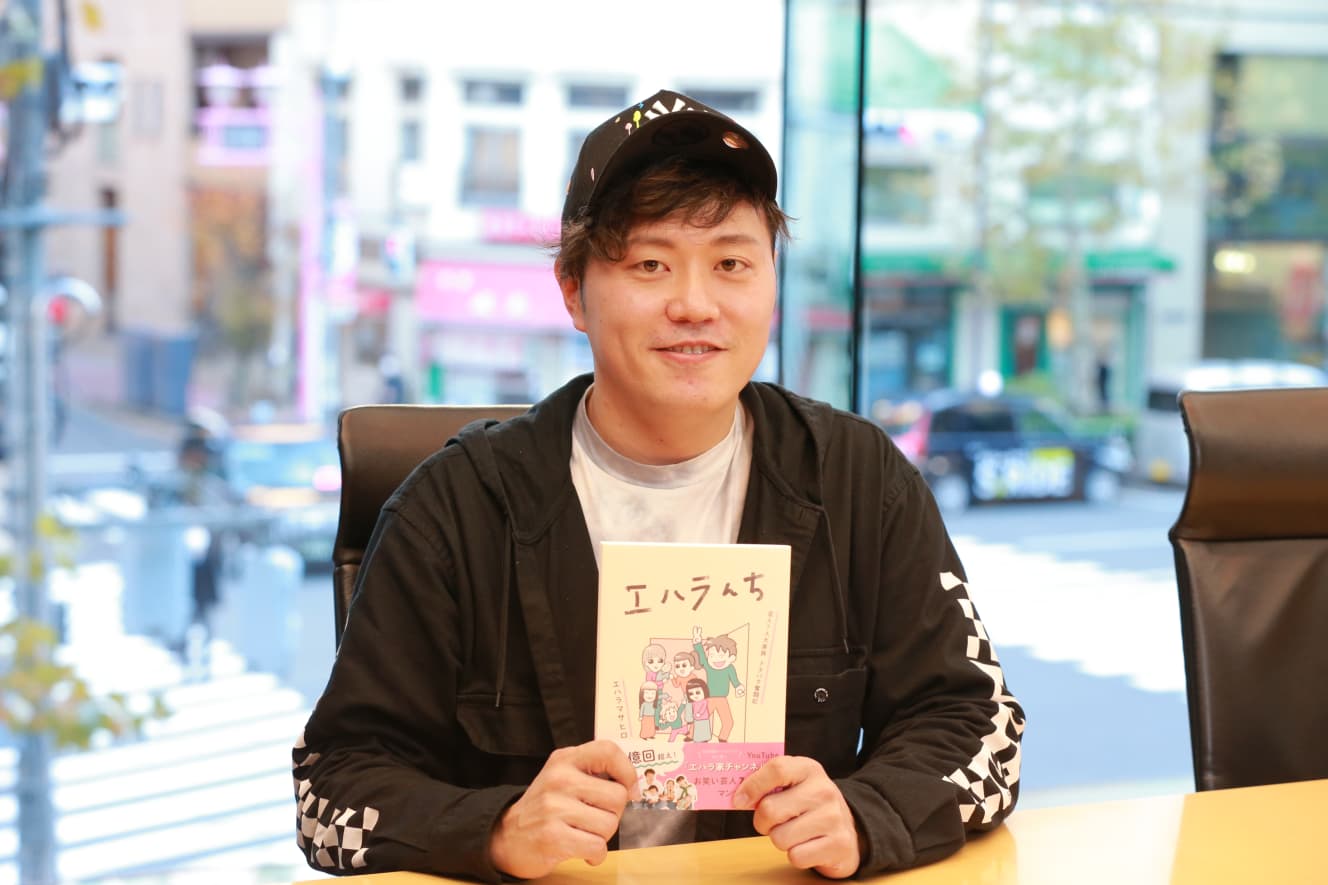Comedian Masahiro Ehara reveals how he makes enough money to feed his five children
On November 26, the comedian Masahiro Ehara published a book titled ” Eharaunchi: A Big Family of Seven Comedians: Databata Tengouki” (Shueisha). This is a manga work about his daily life with his family, living with his wife and five children.
In addition to his manga, Ehara also actively shares his daily life with his family on his YouTube channel “Ehara Family Channel. How did he come to cherish his time with his family?
What are the challenges in terms of income?
–Ehara: Earning enough money to support five children seems like a big deal in itself, but have you ever had any difficulties in terms of income?
Ehara: Well, I’ve been lucky, and I don’t mean to say that I’m an able person, but I’ve been able to balance things out and keep things in check, and since I started making money as a comedian, I haven’t had a single drop in income.
–That’s amazing, because I have the impression that it’s a world of ups and downs.
Ehara: The work I do changes rapidly, but if I study and think about the flow of money and other things, I haven’t had a single drop.
–In 2009 and 2010, you were the runner-up in the “R-1 Grand Prix” (at that time, it was called “R-1 Guranpuri”), and I got the impression that your work increased rapidly during that period, including commercials.
Ehara: During that time, I was doing a lot of work around TV, and I got caught up in an impersonation show and became a semi-regular. But I also wanted to do sharp material, so I also appeared on late night shows like “Arabiki-dan. I thought it would be a good balance to do the major stuff on the Golden TV shows and do the crazy stuff on the late night shows.
But to be honest, I wasn’t making that much money at the time. I thought I was getting some breaks, but my income was just enough for my family to live on. So I decided to make some money for my family, and switched all my jobs to “sales” where I would do stories at local events and shopping malls. I tried to get recognized in sales and make many repeat customers. In general, sales is more lucrative than TV.
–Do you have any tips on how to increase sales?
Ehara: Salespeople are usually trying to buy time. In those days, even if you had 15 minutes for a story, everyone was on “Bakusho Red Carpet” or something like that and only had one minute to tell a story, so some people would tease the audience or talk idly for the first 5 to 10 minutes and then do a little story at the end.
So I would fill the entire show with stories from the beginning and ask, “Can I make it longer? I would ask them if I could make it longer, and show them that I could do it for as long as they wanted (laughs).
(laughs) I was so grateful that I started getting more work from there. I couldn’t accept all the offers to appear on TV that came in a month before the recording because the schedule would fill up months in advance.
That’s when my manager told me. I’ve already turned down all the TV offers. Can you clear your schedule?” But I said, “No, thanks. But I said, “No, thanks. I said, “No, I don’t care. I want you to put all your business first. I had a mission to do what I wanted while protecting my family, so I started making money from that.
–When you’re only doing sales and not appearing on TV, people sometimes think that you’re not selling well or that you’ve disappeared.
Ehara: People would ask me, “What are you doing these days? “Do you have a job? But my income was increasing. So I didn’t think too much about it. Also, I believe that even if I had no entertainment work tomorrow, I would still be able to make some kind of work. There are many ways to do that.
Investors don’t just invest in one company, they invest in all kinds of companies, and if one of them takes off, they can make a lot of money. In the entertainment industry, there are times when singing is booming, times when comedy is booming, times when dance is booming, and so on, and something is always booming somewhere. There’s always something going on somewhere. I’m trying to get my hooks into various things.
–It’s true that you have a wide range of specialties besides comedy, such as mimicry, singing, and dancing.
Ehara: I think it’s really cool to be a person who only does comedy, but I have the impression that such people have a hard time when the comedy boom comes to an end. I think it’s fine for stoic people who only want to do gory comedy, but I have many things I want to do and I’m not obsessed with comedy, so there are times when I don’t do any comedy at all.
Thankfully for that, Chidori-san has been teasing me lately. I don’t do any comedy at all. As a result, it has led to laughter. I’m not afraid of such coincidences.

–When you were the runner-up in “R-1”, you were concentrating on your work and didn’t pay much attention to your family.
Ehara: It was probably because after seven or eight years, I felt that I could do this job for a while. I really thought I would have quit by the time I reached 40, and I thought that not many comedians would stay unless they were MCs.
After I realized that I could make it work, I wanted to spend more time with my children. Children spend a lot of time with their families until elementary school, and their personalities are formed during that time, so I thought it would be better to spend more time with them until then. I thought it would be better to spend more time together until then. So I started to take a lot of time off, and I thought about what to do with this time, and I started to think about YouTube.
–So you started out making money for your family, and then your children grew up, and now you’re making money from their stories on YouTube and in comics. Maybe that’s not what you were aiming for.
Ehara: That’s right. As a result, what we do as a family has become a topic of conversation, and we’ve been invited to appear on TV. I thought that if I didn’t do TV, I wouldn’t be able to spend time with my family, but now that I’m spending time with my family, I’m being invited to do TV, so I feel like a virtuous cycle has been created.
–Ehara: When you do YouTube, you try to make it more like a home video, and you don’t tell your children what you want them to do.
Ehara: If you make them do something, it becomes a job, doesn’t it? Work is not fun because you are forced to do it. It’s fun if you’re told you can do it freely. Children are easy to understand, and everything they do is based on whether it’s fun or not. If you tell them they have to do something, they’ll say, “Why do I have to do it? If they have to do something, they will say, “Why do I have to do it?
So when they’re having fun, I ask them if I can roll the camera. and then start rolling the camera. The kids don’t remember what they filmed. I post videos three times a week, and they ask me, “What’s the next video you’re going to post? They ask me, “What’s the next video? When I tell them, “The other day, we all ate chanko-nabe together,” they say, “Oh, I see, you filmed that. That’s how oblivious I am.
–So you’re just filming people playing and living as they normally do.
Ehara: So it’s the “Terrace House” of the Ehara family. It’s just living with the camera rolling, and it’s all entertainment.
–Do you do the filming and editing by yourself?
Ehara: I just give instructions and ask someone else to do the editing. I’m the one running the camera. Since I’m the director and cameraman, I’m not in most of my channels.
–Ehara: That’s right.
Ehara: Yes. That’s why people are sometimes surprised. Usually there’s a director or someone running the camera, and a celebrity standing in the middle, saying, “Now, this time, …….” I never do that. I never do that. That’s why I can shoot at any time.
But in order to film like that, I have to be making good money from my work, and I have to be able to quit YouTube at any time.
–I see. So if you’re not making money elsewhere, YouTube will become your job.
Ehara: Yes, I would have to make money there. That’s why if my child says “I want to quit” tomorrow, I’ll quit. I started this project because my child wanted to do it.

–I heard that it all started when your eldest daughter said she wanted to do it.
Ehara: That’s right. Now, my second and third daughters are always asking me, “Aren’t you going to film it? My second and third daughters are always asking me if I want to film them. They seem to enjoy the fact that what they are doing can be captured on film. But if my kids don’t like it, I’ll probably stop soon, so I’m not too attached to it.
–I’ve heard that you don’t have an ultimate goal or dream, is that true?
Ehara: Originally, I did, but when I was 23, I set a vision for myself for 33, and I lived my life counting backwards, and it all came true when I was 26. So there was a period of time when I felt like I was burned out, but after that, as I lived my life all the time, new things kept coming up, and the fun was right in front of me all the time when I touched them.
But I always had a complex about the fact that I didn’t have any big goals. So I decided to shake it off a bit and think about how to live a happy life tomorrow. I’m trying to make every day a fun day. So, in terms of a larger goal, I want to be a person who is more satisfied with life than anyone else.
–That includes not only work, but also family and everything else, doesn’t it?
Ehara: Everything, everything. So, if someone says, “I had the most fun in the world today,” I want to be able to say, “No, I probably had more fun than you.
( Click here to buy a copy of “Ehara’s Home” !)
Interviewed and written by: Larry Toda Photography: Kazuhiko Nakamura

